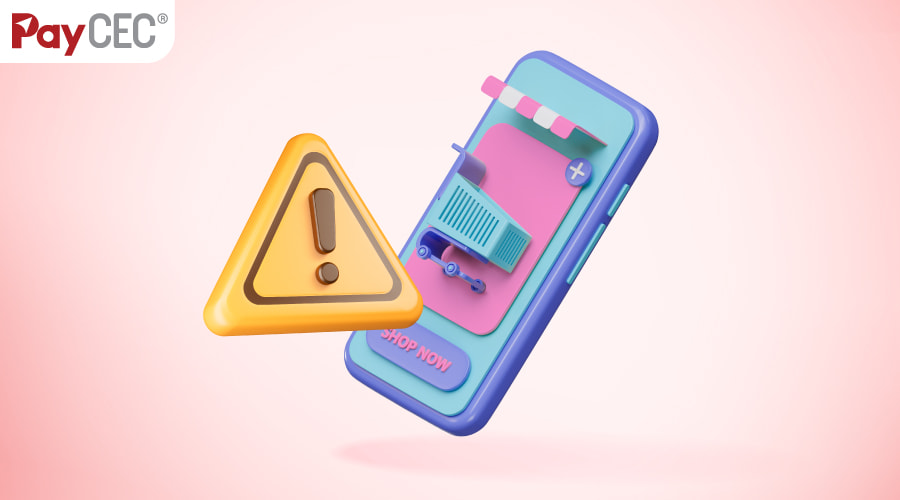- Hotline +65 6631 8332
Have Your Square Account Deactivated? Here’s How to Recover Everything You Lost
Wednesday, 18 Oct, 2023

This article is a part of PayCEC payment insights
Follow PayCEC - global payment gateway to get updates on the latest payment trends and ecommerce news
What's inside?

Having a deactivated Square account is not the end of the world if you know these things.
Square has long been an emblem of innovation, providing frictionless payment processing solutions to companies and people.
Therefore, when a Square account faces deactivation, the consequences go beyond the payment aspect, shaking things up for businesses that have come to rely on its services.
In this article, PayCEC dissects the intricacies of deactivated Square accounts, uncovering the causes of these suspensions and the repercussions felt by impacted users.
Join us as we delve into the heart of this unfolding narrative, seeking answers, insights, and a deeper understanding of the fintech landscape in the wake of suspended Square accounts.
What Happens When Square Closes Your Account?
Square is a financial services and mobile payment company that provides various tools and services for businesses, including a payment gateway. It allows businesses to accept payments through a variety of methods, both in-person and online.
Therefore, a deactivated Square account can lead to potential revenue losses and customer dissatisfaction. Individuals who entrusted Square with their financial activities are left without access to their funds, creating financial distress and uncertainty.
Deactivated Square accounts have extended their reach beyond mere inconvenience. They infiltrate the core of livelihoods, forcing affected users and businesses to explore alternative solutions, often with a sense of urgency and frustration.
Why did Square close my account? Are there adequate safeguards in place to prevent erroneous freezes? Is the fintech industry, as a whole, equipped to handle such issues responsibly and transparently?
This abrupt action has raised fundamental questions about the criteria and mechanisms behind such suspensions, prompting many to seek clarity from Square.
The Reasons Why Square Deactivated Your Account
1. Algorithm Errors

Algorithm problems are one of the reasons why your Square account has been deactivated.
Risk assessment algorithms play a pivotal role in determining which accounts are subject to suspension, making it crucial to examine the mechanics of this process.
These criteria mitigate risks associated with fraud, money laundering, or other illicit activities. These algorithms continuously analyze user behavior, transactions, and account activity to identify suspicious or high-risk behavior.
While they are instrumental in safeguarding against financial misconduct, these algorithms also raise questions about their accuracy and potential for false positives.
While the algorithms excel at identifying suspicious patterns, they are not infallible. False positives—instances where legitimate transactions or activities raise a red flag as high risk—can disrupt users' financial lives.
For example, a sudden influx of revenue due to a successful business promotion may trigger an alarm, resulting in an account suspension.
2. Limited Human Oversight
Fintech companies often rely heavily on automation and algorithms for risk assessment. While this approach offers efficiency, it can sometimes lead to a lack of human oversight.
When complex situations don't fit neatly into algorithmic criteria, you may find it challenging to resolve their issues promptly. The absence of human intervention can exacerbate problems and undermine user confidence.
3. Violation of Terms and Policies
Square follows a set of principles to safeguard consumers from potential threats and preserve the integrity of its platform. Failure to abide by these terms might result in account suspension.
Square's terms and policies underpin its security, reliability, and transparency. These guidelines protect not only Square but also its vast user base, which includes small businesses, independent contractors, and individual consumers.
Therefore, understanding and complying with Square's requirements is essential for ensuring uninterrupted service access. In cases where your Square account is deactivated due to policy violations, Square often provides a communication channel to address the issue.
Preventing Account Deactivation: Proactive Steps for Users

Many Square users are looking for ways to save their accounts from being deactivated.
As suspended Square accounts highlight the potential risks of relying solely on one platform, it is prudent for users to take proactive steps to prevent the same things from happening to their business. From PayCEC's point of view, there are four things you can do:
a. Maintain Transparent Transactions:
- Ensure that your financial transactions are easily traceable. It reduces the likelihood of Square closing your account for suspicious activity.
- Provide accurate and up-to-date information when setting up your account, including your business and contact information.
b. Monitor Account Activity:
- Regularly review your account statements and transaction history for unusual or unauthorized transactions.
- If you notice any discrepancies or suspicious activities, report them to Square's customer support immediately.
c. Understand Square's Policies:
- Familiarize yourself with Square's terms of service, policies, and guidelines. Understanding what is expected of you as a user can help you stay in compliance.
- Stay informed about any updates or changes in Square's policies that may affect your account.
d. Maintain Proper Documentation:
- Keep records of important documents related to your business or personal use of Square. It includes invoices, receipts, and any other relevant paperwork.
- These documents can be crucial when you dispute an account suspension or provide evidence of legitimate transactions.
Square is not the only fintech company to face account suspension controversies. Similar issues have arisen in the past with other fintech platforms, highlighting a broader industry challenge.
Each of these incidents has contributed to a growing body of knowledge about the pitfalls and complexities of account management in the digital financial landscape.
Comparing Square's actions and responses to those of its industry peers can provide valuable insights into industry-wide practices, regulatory compliance, and the importance of proactive risk management strategies.
Square Just Deactivated My Account - What now?
For users and businesses relying on fintech services, having their Square accounts permanently suspended serves as a wake-up call to diversify their strategies. Using one payment processor can be risky, as demonstrated by the potential disruption caused by account suspensions.
As a proactive measure, integrating with another checkout service alongside Square can help mitigate the impact of account suspensions, ensuring that your business operations continue smoothly, even when your Square account has been deactivated. Additionally, it offers extra protection against unforeseen disruptions in the fintech landscape.
Two Is Always Better Than One

PayCEC offers a lifeline that keeps your business afloat in challenging times.
With the advent of deactivated Square accounts, businesses are constantly seeking reliable, efficient, and secure payment solutions to meet the demands of their customers. As a trusted name in the industry, PayCEC offers businesses an innovative, streamlined, and adaptable payment processing platform.
Time is of the essence in the digital age, and PayCEC understands this well. Businesses can integrate our payment gateway into their operations and start accepting payments within 24 hours, saving valuable time and resources that can be redirected toward growth and innovation.
However, PayCEC's strength doesn't stop at simplicity. Employing cutting-edge protocols, PayCEC prioritizes the safety of businesses and their customers, instilling trust and confidence as integral components of our service.
PayCEC delivers all this without breaking the bank. Affordability, a rare virtue in payment solutions, is a defining feature of our offerings. We empower businesses of all sizes to harness our capabilities without sacrificing quality - a combination that emphasizes PayCEC's commitment to accessible excellence.
About PayCEC
PayCEC was established in response to the growing need of businesses to accept online payments more quickly and easily. In the new media era, our payment flow has evolved to work seamlessly and effectively across all platforms and devices. We pride ourselves on combining superior technology with first-class customer service.
PayCEC is a truly global payments platform that not only allows customers to get paid but also withdraws funds to their business accounts in various currencies.
We have created an open and secure payments ecosystem that people and businesses choose to securely transact with each other online and on mobile devices.
Frequently Asked Questions
What happens if Square deactivates my account?
In the world of financial technology, Square is a major player, offering streamlined payment solutions. However, what happens when Square decides to deactivate your account?
- Disruption to Payment Processing:
- Funds on Hold:
- Review and Resolution Process:
- Loss of Payment History:
- Seeking Alternatives:
- Preventing Deactivation:
You can not process payments using the platform when Square closes your account. Customers will no longer be able to make payments, potentially leading to lost sales and revenue.
You won't have instant access to funds. The hold can be placed for a certain amount of time while Square reviews and investigates the grounds for the deactivation.
Square may contact you for information or clarification to determine the cause of the deactivation. It's crucial to cooperate fully during this phase to expedite the resolution.
If Square deactivates your account, you may lose access to your transaction history, including sales records and payment details. It can pose challenges for record-keeping and accounting purposes.
Consider other payment processing options to keep your financial operations running smoothly. PayCEC, a reputable industry name, provides simplified and customizable checkout services.
Prevention is often the best strategy. To avoid deactivation, stay compliant with Square's terms and policies, and respond promptly to their inquiries.
Can I reactivate my Square account?
Yes, but the process involves a few essential steps:
- Review the Cause:
- Contact Square Support:
- Resolve Outstanding Issues:
- Comply and Cooperate:
- Await Review:
- Stay Informed:
First, understand why your Square account has been deactivated. Was it due to compliance issues, chargebacks, or other reasons? Identifying the root cause is pivotal.
Reach out to Square's customer support. They are your allies in the reactivation journey. Be prepared to provide any requested documentation or information.
Address any outstanding matters that led to the deactivation. It could include settling chargebacks, updating account information, or rectifying policy violations.
Square may request additional details or documentation. Ensure timely and thorough responses. Compliance and cooperation are crucial to a successful reactivation.
After you've taken these steps, Square will conduct a review. Be patient during this process, as it may take some time.
Stay updated on Square's policies and terms to prevent future issues. Proactive compliance is the best strategy.
Recovering your Square account is possible, provided you address the underlying issues and cooperate with Square's review process. It's a chance to unlock the full potential of Square's financial services once again.
Why won’t Square let me deactivate my account?
The inability to deactivate a Square account can be a frustrating experience. Several reasons may contribute to this problem:
- Pending Transactions or Funds:
- Outstanding Charges or Fees:
- Compliance or Policy Violations:
- Ongoing Disputes:
- Contacting Square Support:
Square may restrict deactivation if there are pending transactions or funds in your account. Square often requires users to clear all transactions to avoid disputes or financial issues.
If you owe Square any fees or have unresolved financial matters, they may withhold deactivation until these issues are resolved. Clearing outstanding balances is typically a prerequisite.
If your account is under investigation due to compliance or policy violations, Square may suspend deactivation. They may require additional information or documentation from you to address any potential violations.
If you have continuing problems with consumers, such as chargebacks, Square may block deactivation. They may need to guarantee that these disagreements are properly settled before permitting account termination.
If you're experiencing difficulty deactivating your account, the best action is to contact Square's customer support. They can provide specific guidance tailored to your situation and assist you in resolving any outstanding issues preventing deactivation.
Why would Square deactivate my account?
Square closes your account for many reasons, most of which threaten its integrity, security, and compliance with financial rules. The following are some of the most prevalent causes of account deactivation:
- Violation of Square's Terms of Service: Square has a set of rules and guidelines that users must follow. If you participate in fraudulent activity or questionable transactions, you risk having your Square account permanently deactivated.
- Suspicious or High-Risk Activity: Square employs state-of-the-art fraud detection mechanisms. Any unusual spikes in activity, peculiar transaction patterns, or a flurry of disputed payments can lead to account deactivation.
- Failure to Provide Requested Documentation: Sometimes, Square may ask for additional documents or information for verification. Failure to produce these papers on time may result in your suspended Square account.
- Chargebacks and Disputes: A deluge of chargebacks or unresolved customer disputes can spell trouble. Square may view this as a red flag, indicating potential issues with your business or customer satisfaction.
- Regulatory Compliance: Noncompliance with anti-money laundering (AML) or know-your-customer (KYC) regulations can be why Square closes your account.
- Account Inactivity: Sometimes, inactivity can be the culprit. If your Square account sits idly for an extended period, it may be a security risk.
The good news is that if your Square account faces suspension, you can often appeal the decision. Reach out to Square's customer support to understand the reason behind the curtain drop and work together to resolve the issue.
News
Business
Products

who we are
about us
We are honored to serve as your reliable business partner and financial service provider in the industry and other business-related services. With the help of our professional staff, to help merchants to achieve their goals for the development and expansion of the international business market.
Our payment flow has developed in the e-commerce world to perform seamlessly and effectively across all platforms and devices. We take pleasure in combining technology with customer service, to solve your concerns at the moment.
PayCEC is a fully worldwide payment network that not only allows merchants to be paid immediately and securely, but also allows them to withdraw money in multiple currencies to their company accounts.
































 +65 6631 8332
+65 6631 8332






 Processing
Processing